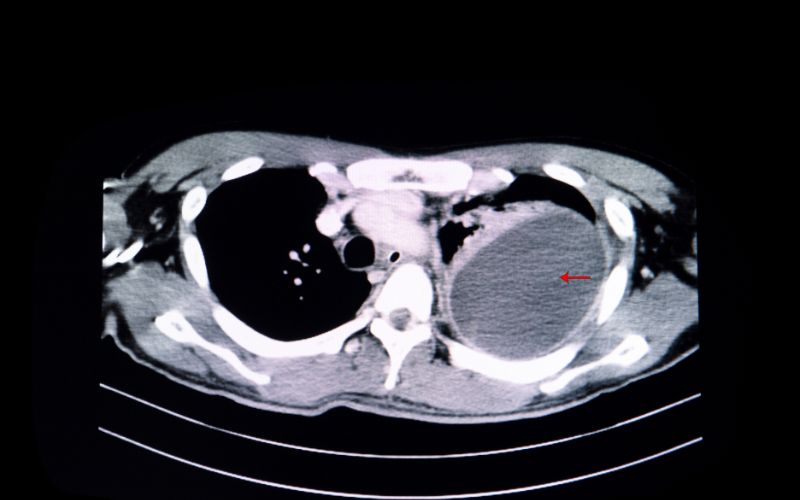Heart health is a crucial aspect of the overall wellness of the human body. However, certain conditions like pericardial effusion can affect the normal functioning of the heart. The human heart is enclosed in a protective sac called the pericardium, which contains a small amount of liquid called pericardial fluid.
Pericardial effusion is a medical condition where excess fluid accumulates in the pericardial sac that surrounds the heart. Large fluid buildup results in compression of the heart, affecting its ability to pump blood.
What is Pericardial Effusion?
The pericardium is a double-layered sac that covers the heart. This sac contains a thin fluid that helps the heart absorb shocks and act as a cushion during its rhythmic contractions and relaxations.
When there is an excess build of fluid accumulation, it causes pericardial effusion.
In healthy people, the pericardium is filled with approximately 15 mL to 50 mL of clear, yellowish fluid called pericardial fluid. If you have effusion, more than 100 mL of fluid is accumulated around the heart.
The severity of pericardial effusion depends on the following factors:
- Causes of fluid accumulation, infection, past injuries, etc
- Amount of fluid gathered
- How fast the fluid fills your pericardium.
Pericardial fluid accumulation is common and can happen to people of any age due to injuries or infection. The severe stage of effusion can lead to pericardial tamponade, where the heart starts compressing due to the overflow of fluid.
Causes of Pericardial Effusion
The causes of pericardial effusion are as follows:
- Pericarditis, that is, Inflammation of the pericardium.
- Hormone disorder that includes hypothyroidism or ovarian hyperstimulation syndrome.
- Viral, bacterial, fungal, or tuberculosis-related infections
- Autoimmune diseases like lupus, rheumatoid arthritis, Sjögren syndrome, and scleroderma
- Heart problems that include tearing or damage to the blood vessels, heart attack, etc.
- Lungs, breast, and blood cancer also cause fluid buildup
- Complications from chronic diseases like Kidney dysfunction or liver cirrhosis.
- Complications after cardiac or chest surgery
Symptoms of Pericardial Effusion
The level of pericardial fluid accumulation ranges from mild to severe. One may not notice symptoms in mild effusion; however, if the severity increases, you may experience symptoms like:
- Shortness of breath
- Discomfort or pain in the chest
- Fatigue and weakness
- Irregular heartbeats or palpitations
- Swelling in legs or abdomen
- Dizziness and insomnia
- Trouble in swallowing
- Hiccups
- Low blood pressure
Complications of Pericardial Effusion
A pericardial effusion can lead to cardiac tamponade. Cardiac tamponade is a life-threatening situation in which the heart is surrounded by excessive fluid, making it difficult to pump blood to the different chambers of the heart. It can lead to several other issues like shock and multiple organ failure.
Symptoms of cardiac tamponade include:
- Pale skin and nails
- Fast pulse and heart palpitations
- Lightheadedness
- Anxiety
The key difference between cardiac tamponade vs pericardial effusion is as follows
| Feature | Pericardial Effusion | Cardiac Tamponade |
| Condition | Fluid buildup in the pericardial sac of the heart. | Compression of the heart due to the overflow of fluid, causing a life-threatening situation. |
| Symptoms | Mild symptoms like fatigue, anxiety, and slight pain in chest | Extreme symptoms like shortness of breath, low BP, shock |
| ECG findings | Pericardial effusion ECG findings include Low voltage, QRS, and electrical alternans | Cardiac Tamponade ECG findings include electrical alternans, sinus tachycardia, etc |
| Treatment | Observation, drainage of excess fluid | Pericardiocentesis |
Diagnosis of Pericardial effusion
Mild pericardial effusion needs minimum intervention, but if you are experiencing severe symptoms, the specialist at heart hospital in Delhi will conduct the following tests:
- Heart effusion ECG, where sound waves are used to show the heart in motion. It can determine the amount of fluid in the pericardium. It is also used to determine the overall function of the heart.
- A pericardial heart X-ray is used to visualize the size of the pericardial sac, which indicates the amount of fluid accumulation around the heart.
- CT scans and MRI are highly sensitive evaluations that help to detect pericardial effusion and provide a clear picture of the pericardium to understand the causes better.

Treatment of pericardial effusion in Delhi
Pericardial effusion treatment or fluid accumulation around heart treatment includes the following:
- For mild cases, cardiologists in Delhi monitor your heart with regular echocardiograms and give medications that include NSAIDs, corticosteroids, and diuretics to reduce fluid overload.
- Pericardiocentesis, where excess fluid is drained out of the pericardial sac through minimal invasion.
- In case of moderate to severe pericardial effusion or recurring occurrence of fluid, pericardial window surgery is performed. In this process, an opening is created in the pericardium that allows continuous drainage of over-accumulated fluid.
- In severe cases, when the fluid reappears, pericardiotomy is performed, which involves the removal of a small part or the entire pericardium so that no fluid can collect in it.
- In case of injuries to the pericardium, open heart surgery is performed to repair the damage in case of bleeding inside the pericardium.
Prevention
All cases of pericardial fluid accumulation can not be prevented, however, you should take some measures to avoid its development or reduce the risk:
- Manage autoimmune diseases and ensure a healthy kidney and liver function
- A routine checkup to a heart hospital in Delhi can help to detect early signs of fluid accumulation.
- Bacterial, viral, or fungal infections should be treated in a timely manner as they can also lead to pericardial effusion.
- Maintain a healthy lifestyle. Regular exercise and a balanced diet improved overall heart health
- Avoid smoking, consuming alcohol, and using unnecessary drugs.
- Follow strict post-operative care in case you have undergone heart surgery.
Pericardial effusion can affect your overall heart health, which can deteriorate your quality of life. If the preventive measures are not taken with proper diagnosis and treatment, it can lead to life-threatening complications.
For comprehensive care of your heart and any problems related to it, visit Kalra Hospital, one of the leading cardiology hospitals in Delhi. We have a group of experienced cardiologists, advanced technology, and personalised care to cater to our patients. Take a first step towards a healthy heart. Book your consultation online or visit Kalra Hospital today!








